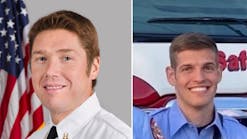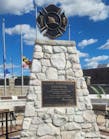Toledo, OH -- Mark Frankforther, like all Toledo firefighters, is not supposed to go into a burning building alone. But Sunday, with seven children inside a burning South Toledo apartment, he did what he had to do.
The 12-year veteran hauled a fire hose up the stairs to the second floor of the burning unit at 5118 Norwich Rd., struggling with the line a couple of times because the front door kept closing on it. But Mr. Frankforther, 48, had to stop momentarily at the top of the stairs to pour water on flames that were shooting from a rear upstairs bedroom, blocking access to the second-floor hallway.
His Engine 11 crew mate, Dexter Baker - who immediately called for a second alarm when their three-man engine arrived at the scene - soon joined him inside. The two knocked down the flames in their path and began to search through the four bedrooms for the youngsters.
"We were getting up there as fast as we could to get to those children," Mr. Baker, a 33-year-old father of two young children, emphasized yesterday at Station No. 11.
The station is at 4820 Airport Hwy., just east of Reynolds Road and less than a half-mile from the fire scene.
Despite their best efforts and those of other firefighters and paramedics who responded, the seven children retrieved from the burning structure - ages 7 months to 7 years - all died.
Killed were Brian McCullough, 5; his sisters, Brionna McCullough, 2; Teairia McCullough, 7; Talia Sanders, 19 months; Tanija Sanders, 7 months, and Terri Sanders, 6; and their cousin, Quanisha Kirk, 7.
All died of smoke inhalation, according to the Lucas County coroner's office.
Fire officials believe the blaze was started on a mattress or bedding in a rear bedroom by one of the children using a match, lighter, or candle.
Mr. Frankforther and Mr. Baker - both of whom arrived on the scene first with colleague Ted Bienko - did not spot any of the children in the first, smoky, dark bedroom they searched. Through blinding smoke and heat, Mr. Frankforther crawled to the other front bedroom and with the help of a flashlight could see two children lying together on the floor at the foot of a bed.
He said he yelled to Mr. Baker, and they separated the children. Mr. Baker felt one of them, grabbed the diapered child, crouched down the hallway, and walked down the steps. Mr. Frankforther followed carrying a limp girl.
It was the first time either man had rescued a child.
"You just do what you can as soon as you can," Mr. Frankforther said.
Once outside, both firefighters immediately began lifesaving efforts. One used a bag to artificially fill the child's lungs with clean air. The other started performing mouth-to-mouth resuscitation.
Mr. Baker, a firefighter for eight years, helped the other rescued children after his was taken to an area hospital. Mr. Frankforther stayed with the child he had all the way to Toledo Hospital.
Fifteen-year firefighter Michael Fuelling, a 39-year-old father of two boys, did the same after rescuing the 19-month-old.
Mr. Fuelling, who is assigned to Station 7 at Bancroft Street and Franklin Avenue in central Toledo, said the toddler and three others were piled on the floor of a front bedroom at the foot of a bed. Visibility was poor, but the children could be seen when firefighters bent down to floor level.
"That 19-month-old was like my baby for 40 minutes," he said. "I did not leave that child until she was pronounced [dead.] It was a feeling I had. There's a connection that's made. I felt I had to see it through."
Some people at the fire scene criticized firefighters for a slow response. But Fire Chief Mike Bell said the Engine 11 crew arrived one minute after being dispatched at 2:38 p.m. The chief said the first child retrieved from the apartment was brought out in less than seven minutes.
Mr. Fuelling's crew - who traveled about seven miles to the scene - arrived 11 minutes after the call was dispatched.
Mr. Baker said his colleagues never lost focus of getting the children even though they were minus two members of the station's five-member crew. The other two were on an unrelated emergency medical services run that was called in before the fire.
Mr. Baker said he and his two colleagues were preparing for the fire run before they were dispatched because they received an advance call from the dispatch office about the blaze.
Mr. Baker said Mr. Bienko would not have been completely suited up when he arrived because he was driving their fire engine. Mr. Bienko then set up the pumps to get water, pulled off the hose Mr. Frankforther took into the apartment, and turned on the access valve to the 500 gallons of water stored in the truck.
Mr. Baker was talking on a radio calling for a second alarm and providing dispatch and the battalion chief with information about the on-scene situation. When the battalion chief arrived to take over command, Mr. Baker put on his mask and went into the apartment.
"We did our job," Mr. Baker said somberly. "We did the best job that could be done."





